The Impact of Employee Relationships on Tesco's Stakeholders: A Report
VerifiedAdded on 2023/01/12
|11
|3514
|59
Report
AI Summary
This report provides an in-depth analysis of employee relationships within Tesco, a major UK-based retailer. It begins by highlighting the value and importance of strong employee relationships, emphasizing their impact on coordination, employee loyalty, conflict reduction, productivity, and morale. The report then details fundamental employment laws followed by Tesco, including the Employment Rights Act 1996, the National Minimum Wage Act 1998, and the Employment Relationship Act 1999, and suggests recommendations for improving employee relations. It subsequently outlines the rights, duties, and obligations of both employers and employees, such as providing a safe environment, equal opportunities, and respect, while also emphasizing employee responsibilities. A crucial section of the report involves a stakeholder analysis, categorizing stakeholders based on their power and interest, and explaining how stakeholder engagement contributes to positive employment relationships. The report concludes by discussing the impact of both positive and negative employee relations on various stakeholders, offering a comprehensive overview of the subject.
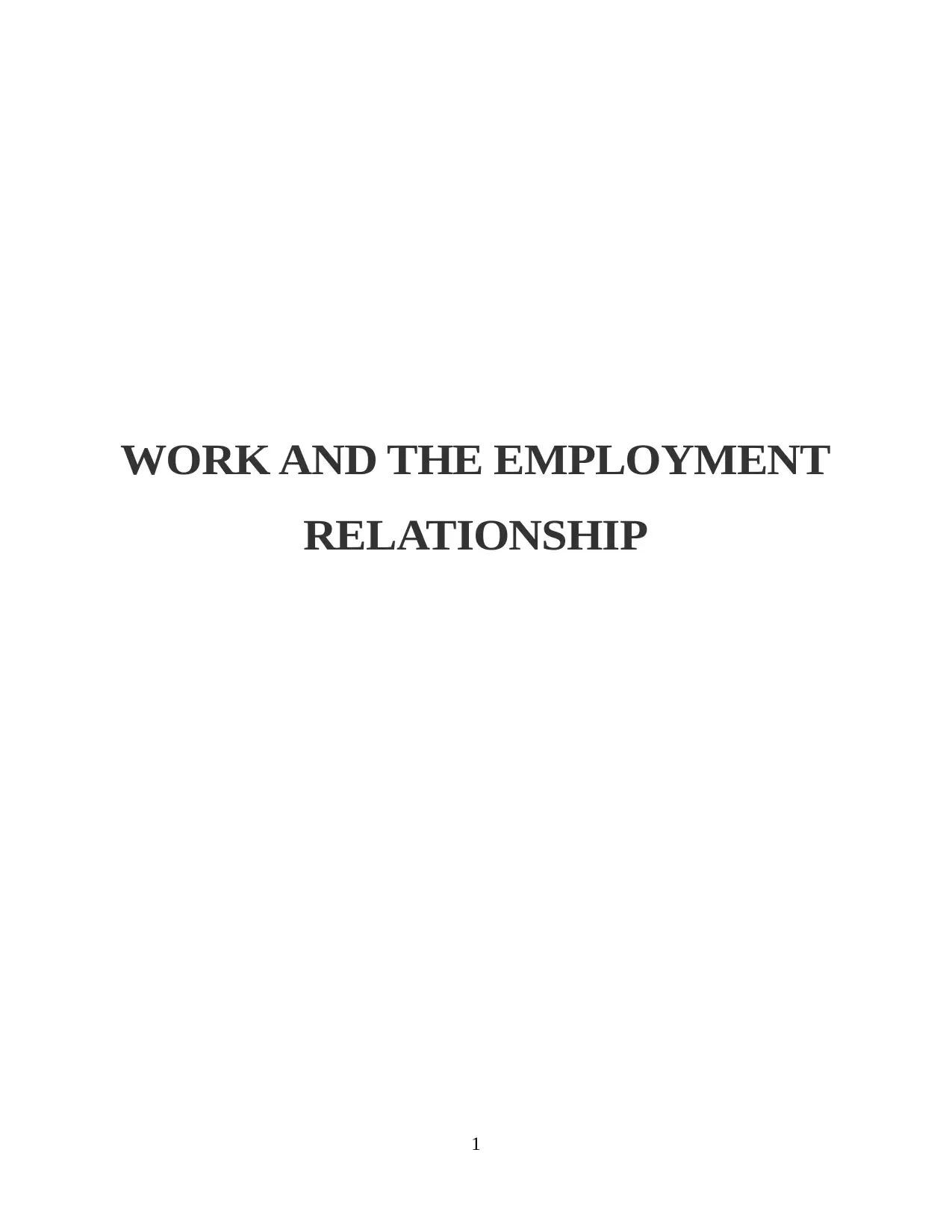
WORK AND THE EMPLOYMENT
RELATIONSHIP
1
RELATIONSHIP
1
Paraphrase This Document
Need a fresh take? Get an instant paraphrase of this document with our AI Paraphraser
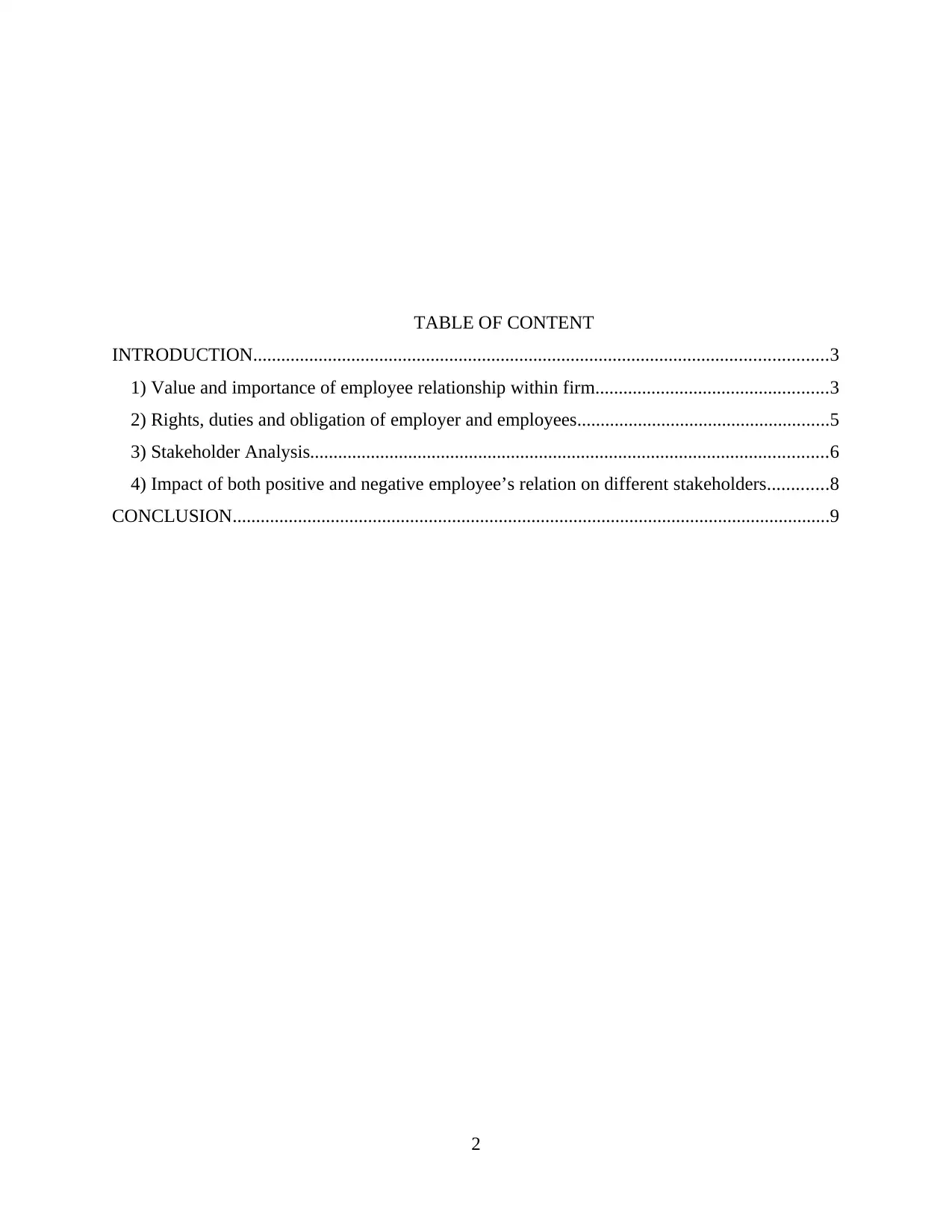
TABLE OF CONTENT
INTRODUCTION...........................................................................................................................3
1) Value and importance of employee relationship within firm..................................................3
2) Rights, duties and obligation of employer and employees......................................................5
3) Stakeholder Analysis...............................................................................................................6
4) Impact of both positive and negative employee’s relation on different stakeholders.............8
CONCLUSION................................................................................................................................9
2
INTRODUCTION...........................................................................................................................3
1) Value and importance of employee relationship within firm..................................................3
2) Rights, duties and obligation of employer and employees......................................................5
3) Stakeholder Analysis...............................................................................................................6
4) Impact of both positive and negative employee’s relation on different stakeholders.............8
CONCLUSION................................................................................................................................9
2
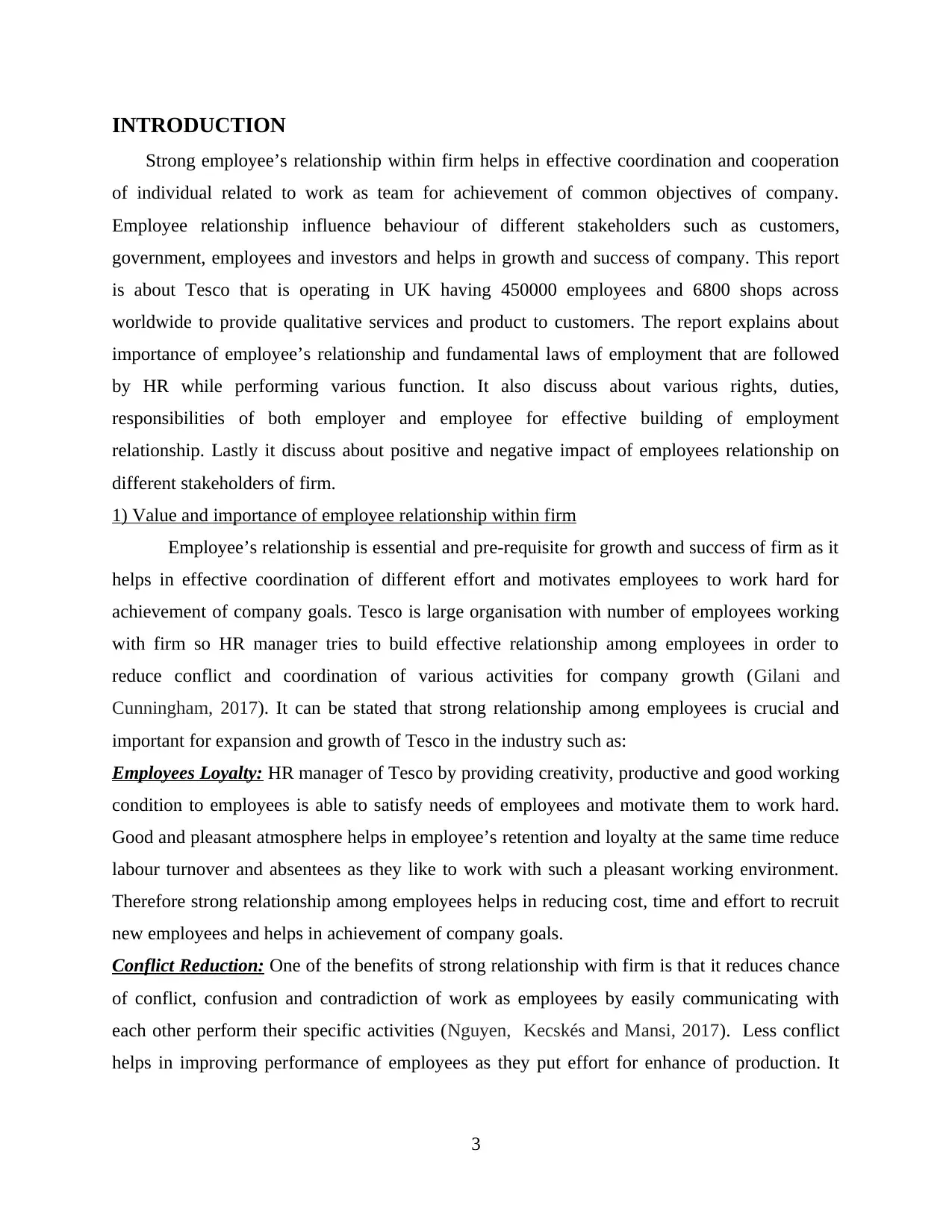
INTRODUCTION
Strong employee’s relationship within firm helps in effective coordination and cooperation
of individual related to work as team for achievement of common objectives of company.
Employee relationship influence behaviour of different stakeholders such as customers,
government, employees and investors and helps in growth and success of company. This report
is about Tesco that is operating in UK having 450000 employees and 6800 shops across
worldwide to provide qualitative services and product to customers. The report explains about
importance of employee’s relationship and fundamental laws of employment that are followed
by HR while performing various function. It also discuss about various rights, duties,
responsibilities of both employer and employee for effective building of employment
relationship. Lastly it discuss about positive and negative impact of employees relationship on
different stakeholders of firm.
1) Value and importance of employee relationship within firm
Employee’s relationship is essential and pre-requisite for growth and success of firm as it
helps in effective coordination of different effort and motivates employees to work hard for
achievement of company goals. Tesco is large organisation with number of employees working
with firm so HR manager tries to build effective relationship among employees in order to
reduce conflict and coordination of various activities for company growth (Gilani and
Cunningham, 2017). It can be stated that strong relationship among employees is crucial and
important for expansion and growth of Tesco in the industry such as:
Employees Loyalty: HR manager of Tesco by providing creativity, productive and good working
condition to employees is able to satisfy needs of employees and motivate them to work hard.
Good and pleasant atmosphere helps in employee’s retention and loyalty at the same time reduce
labour turnover and absentees as they like to work with such a pleasant working environment.
Therefore strong relationship among employees helps in reducing cost, time and effort to recruit
new employees and helps in achievement of company goals.
Conflict Reduction: One of the benefits of strong relationship with firm is that it reduces chance
of conflict, confusion and contradiction of work as employees by easily communicating with
each other perform their specific activities (Nguyen, Kecskés and Mansi, 2017). Less conflict
helps in improving performance of employees as they put effort for enhance of production. It
3
Strong employee’s relationship within firm helps in effective coordination and cooperation
of individual related to work as team for achievement of common objectives of company.
Employee relationship influence behaviour of different stakeholders such as customers,
government, employees and investors and helps in growth and success of company. This report
is about Tesco that is operating in UK having 450000 employees and 6800 shops across
worldwide to provide qualitative services and product to customers. The report explains about
importance of employee’s relationship and fundamental laws of employment that are followed
by HR while performing various function. It also discuss about various rights, duties,
responsibilities of both employer and employee for effective building of employment
relationship. Lastly it discuss about positive and negative impact of employees relationship on
different stakeholders of firm.
1) Value and importance of employee relationship within firm
Employee’s relationship is essential and pre-requisite for growth and success of firm as it
helps in effective coordination of different effort and motivates employees to work hard for
achievement of company goals. Tesco is large organisation with number of employees working
with firm so HR manager tries to build effective relationship among employees in order to
reduce conflict and coordination of various activities for company growth (Gilani and
Cunningham, 2017). It can be stated that strong relationship among employees is crucial and
important for expansion and growth of Tesco in the industry such as:
Employees Loyalty: HR manager of Tesco by providing creativity, productive and good working
condition to employees is able to satisfy needs of employees and motivate them to work hard.
Good and pleasant atmosphere helps in employee’s retention and loyalty at the same time reduce
labour turnover and absentees as they like to work with such a pleasant working environment.
Therefore strong relationship among employees helps in reducing cost, time and effort to recruit
new employees and helps in achievement of company goals.
Conflict Reduction: One of the benefits of strong relationship with firm is that it reduces chance
of conflict, confusion and contradiction of work as employees by easily communicating with
each other perform their specific activities (Nguyen, Kecskés and Mansi, 2017). Less conflict
helps in improving performance of employees as they put effort for enhance of production. It
3
⊘ This is a preview!⊘
Do you want full access?
Subscribe today to unlock all pages.

Trusted by 1+ million students worldwide
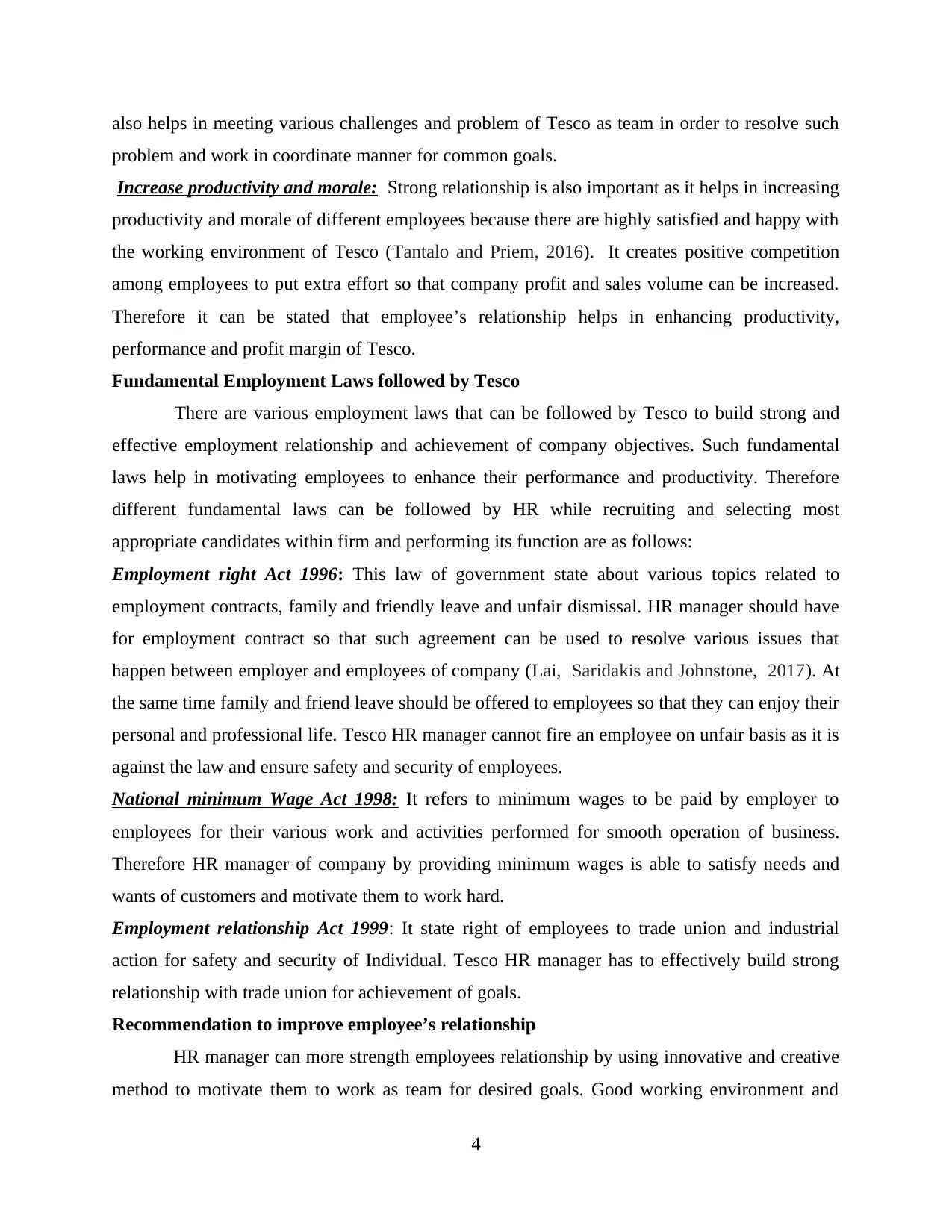
also helps in meeting various challenges and problem of Tesco as team in order to resolve such
problem and work in coordinate manner for common goals.
Increase productivity and morale: Strong relationship is also important as it helps in increasing
productivity and morale of different employees because there are highly satisfied and happy with
the working environment of Tesco (Tantalo and Priem, 2016). It creates positive competition
among employees to put extra effort so that company profit and sales volume can be increased.
Therefore it can be stated that employee’s relationship helps in enhancing productivity,
performance and profit margin of Tesco.
Fundamental Employment Laws followed by Tesco
There are various employment laws that can be followed by Tesco to build strong and
effective employment relationship and achievement of company objectives. Such fundamental
laws help in motivating employees to enhance their performance and productivity. Therefore
different fundamental laws can be followed by HR while recruiting and selecting most
appropriate candidates within firm and performing its function are as follows:
Employment right Act 1996: This law of government state about various topics related to
employment contracts, family and friendly leave and unfair dismissal. HR manager should have
for employment contract so that such agreement can be used to resolve various issues that
happen between employer and employees of company (Lai, Saridakis and Johnstone, 2017). At
the same time family and friend leave should be offered to employees so that they can enjoy their
personal and professional life. Tesco HR manager cannot fire an employee on unfair basis as it is
against the law and ensure safety and security of employees.
National minimum Wage Act 1998: It refers to minimum wages to be paid by employer to
employees for their various work and activities performed for smooth operation of business.
Therefore HR manager of company by providing minimum wages is able to satisfy needs and
wants of customers and motivate them to work hard.
Employment relationship Act 1999: It state right of employees to trade union and industrial
action for safety and security of Individual. Tesco HR manager has to effectively build strong
relationship with trade union for achievement of goals.
Recommendation to improve employee’s relationship
HR manager can more strength employees relationship by using innovative and creative
method to motivate them to work as team for desired goals. Good working environment and
4
problem and work in coordinate manner for common goals.
Increase productivity and morale: Strong relationship is also important as it helps in increasing
productivity and morale of different employees because there are highly satisfied and happy with
the working environment of Tesco (Tantalo and Priem, 2016). It creates positive competition
among employees to put extra effort so that company profit and sales volume can be increased.
Therefore it can be stated that employee’s relationship helps in enhancing productivity,
performance and profit margin of Tesco.
Fundamental Employment Laws followed by Tesco
There are various employment laws that can be followed by Tesco to build strong and
effective employment relationship and achievement of company objectives. Such fundamental
laws help in motivating employees to enhance their performance and productivity. Therefore
different fundamental laws can be followed by HR while recruiting and selecting most
appropriate candidates within firm and performing its function are as follows:
Employment right Act 1996: This law of government state about various topics related to
employment contracts, family and friendly leave and unfair dismissal. HR manager should have
for employment contract so that such agreement can be used to resolve various issues that
happen between employer and employees of company (Lai, Saridakis and Johnstone, 2017). At
the same time family and friend leave should be offered to employees so that they can enjoy their
personal and professional life. Tesco HR manager cannot fire an employee on unfair basis as it is
against the law and ensure safety and security of employees.
National minimum Wage Act 1998: It refers to minimum wages to be paid by employer to
employees for their various work and activities performed for smooth operation of business.
Therefore HR manager of company by providing minimum wages is able to satisfy needs and
wants of customers and motivate them to work hard.
Employment relationship Act 1999: It state right of employees to trade union and industrial
action for safety and security of Individual. Tesco HR manager has to effectively build strong
relationship with trade union for achievement of goals.
Recommendation to improve employee’s relationship
HR manager can more strength employees relationship by using innovative and creative
method to motivate them to work as team for desired goals. Good working environment and
4
Paraphrase This Document
Need a fresh take? Get an instant paraphrase of this document with our AI Paraphraser
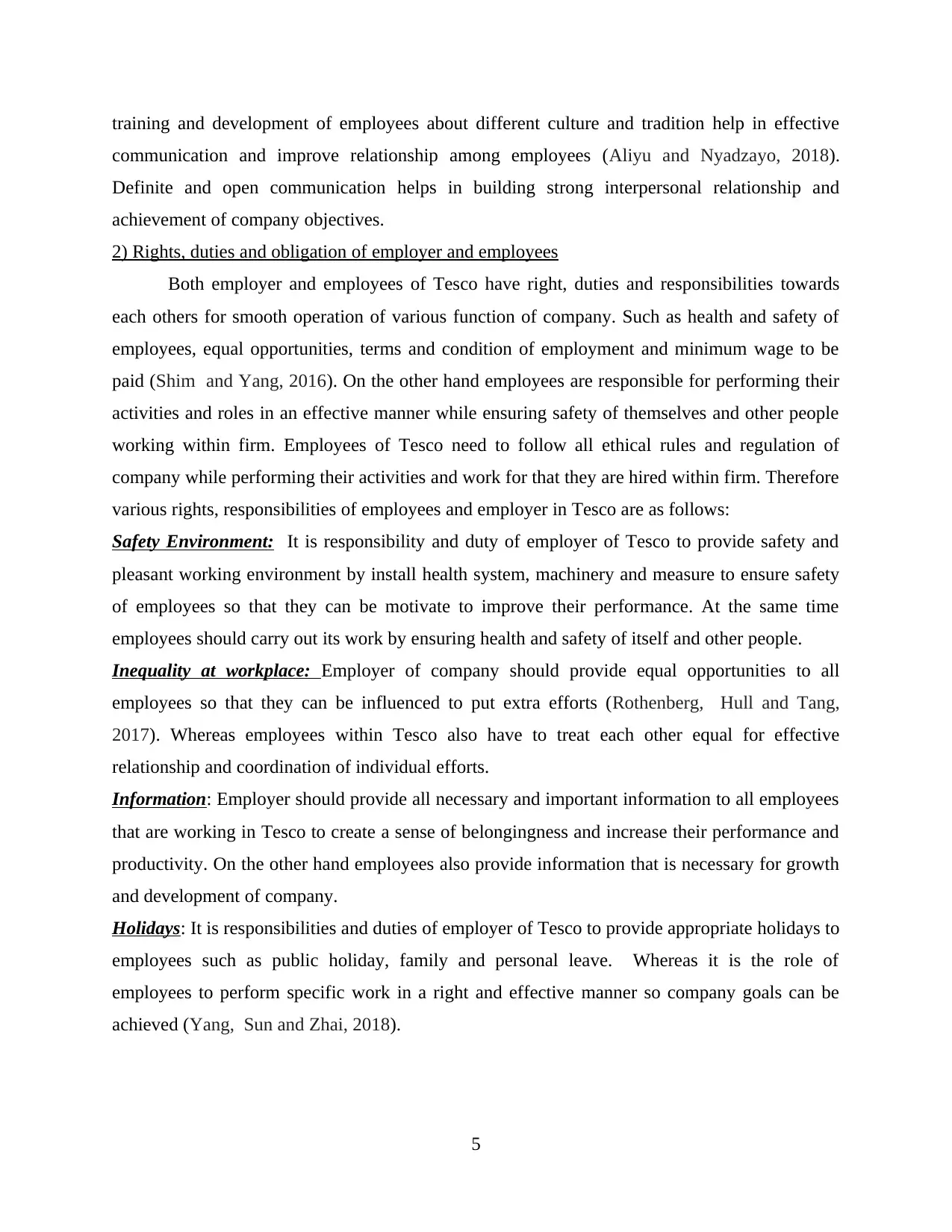
training and development of employees about different culture and tradition help in effective
communication and improve relationship among employees (Aliyu and Nyadzayo, 2018).
Definite and open communication helps in building strong interpersonal relationship and
achievement of company objectives.
2) Rights, duties and obligation of employer and employees
Both employer and employees of Tesco have right, duties and responsibilities towards
each others for smooth operation of various function of company. Such as health and safety of
employees, equal opportunities, terms and condition of employment and minimum wage to be
paid (Shim and Yang, 2016). On the other hand employees are responsible for performing their
activities and roles in an effective manner while ensuring safety of themselves and other people
working within firm. Employees of Tesco need to follow all ethical rules and regulation of
company while performing their activities and work for that they are hired within firm. Therefore
various rights, responsibilities of employees and employer in Tesco are as follows:
Safety Environment: It is responsibility and duty of employer of Tesco to provide safety and
pleasant working environment by install health system, machinery and measure to ensure safety
of employees so that they can be motivate to improve their performance. At the same time
employees should carry out its work by ensuring health and safety of itself and other people.
Inequality at workplace: Employer of company should provide equal opportunities to all
employees so that they can be influenced to put extra efforts (Rothenberg, Hull and Tang,
2017). Whereas employees within Tesco also have to treat each other equal for effective
relationship and coordination of individual efforts.
Information: Employer should provide all necessary and important information to all employees
that are working in Tesco to create a sense of belongingness and increase their performance and
productivity. On the other hand employees also provide information that is necessary for growth
and development of company.
Holidays: It is responsibilities and duties of employer of Tesco to provide appropriate holidays to
employees such as public holiday, family and personal leave. Whereas it is the role of
employees to perform specific work in a right and effective manner so company goals can be
achieved (Yang, Sun and Zhai, 2018).
5
communication and improve relationship among employees (Aliyu and Nyadzayo, 2018).
Definite and open communication helps in building strong interpersonal relationship and
achievement of company objectives.
2) Rights, duties and obligation of employer and employees
Both employer and employees of Tesco have right, duties and responsibilities towards
each others for smooth operation of various function of company. Such as health and safety of
employees, equal opportunities, terms and condition of employment and minimum wage to be
paid (Shim and Yang, 2016). On the other hand employees are responsible for performing their
activities and roles in an effective manner while ensuring safety of themselves and other people
working within firm. Employees of Tesco need to follow all ethical rules and regulation of
company while performing their activities and work for that they are hired within firm. Therefore
various rights, responsibilities of employees and employer in Tesco are as follows:
Safety Environment: It is responsibility and duty of employer of Tesco to provide safety and
pleasant working environment by install health system, machinery and measure to ensure safety
of employees so that they can be motivate to improve their performance. At the same time
employees should carry out its work by ensuring health and safety of itself and other people.
Inequality at workplace: Employer of company should provide equal opportunities to all
employees so that they can be influenced to put extra efforts (Rothenberg, Hull and Tang,
2017). Whereas employees within Tesco also have to treat each other equal for effective
relationship and coordination of individual efforts.
Information: Employer should provide all necessary and important information to all employees
that are working in Tesco to create a sense of belongingness and increase their performance and
productivity. On the other hand employees also provide information that is necessary for growth
and development of company.
Holidays: It is responsibilities and duties of employer of Tesco to provide appropriate holidays to
employees such as public holiday, family and personal leave. Whereas it is the role of
employees to perform specific work in a right and effective manner so company goals can be
achieved (Yang, Sun and Zhai, 2018).
5
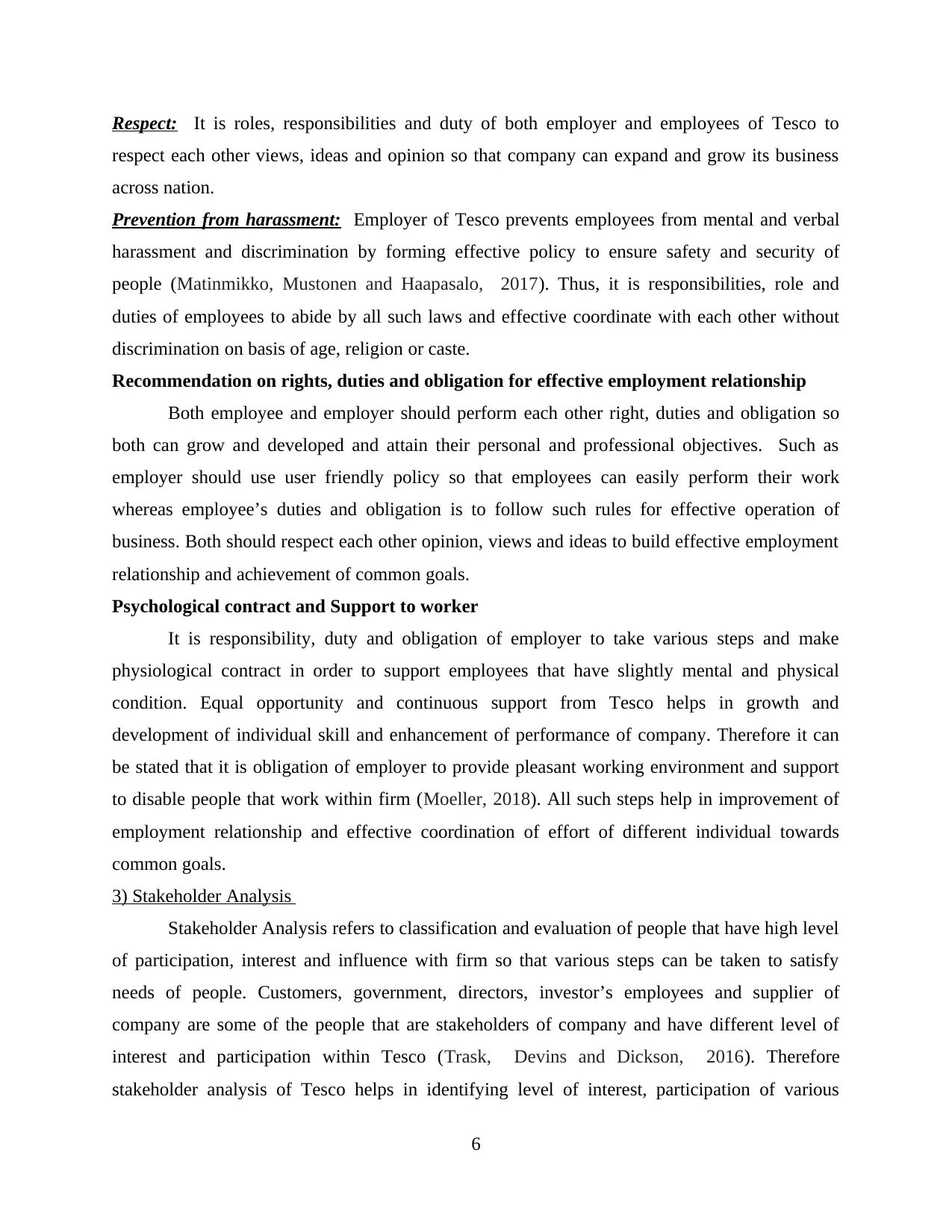
Respect: It is roles, responsibilities and duty of both employer and employees of Tesco to
respect each other views, ideas and opinion so that company can expand and grow its business
across nation.
Prevention from harassment: Employer of Tesco prevents employees from mental and verbal
harassment and discrimination by forming effective policy to ensure safety and security of
people (Matinmikko, Mustonen and Haapasalo, 2017). Thus, it is responsibilities, role and
duties of employees to abide by all such laws and effective coordinate with each other without
discrimination on basis of age, religion or caste.
Recommendation on rights, duties and obligation for effective employment relationship
Both employee and employer should perform each other right, duties and obligation so
both can grow and developed and attain their personal and professional objectives. Such as
employer should use user friendly policy so that employees can easily perform their work
whereas employee’s duties and obligation is to follow such rules for effective operation of
business. Both should respect each other opinion, views and ideas to build effective employment
relationship and achievement of common goals.
Psychological contract and Support to worker
It is responsibility, duty and obligation of employer to take various steps and make
physiological contract in order to support employees that have slightly mental and physical
condition. Equal opportunity and continuous support from Tesco helps in growth and
development of individual skill and enhancement of performance of company. Therefore it can
be stated that it is obligation of employer to provide pleasant working environment and support
to disable people that work within firm (Moeller, 2018). All such steps help in improvement of
employment relationship and effective coordination of effort of different individual towards
common goals.
3) Stakeholder Analysis
Stakeholder Analysis refers to classification and evaluation of people that have high level
of participation, interest and influence with firm so that various steps can be taken to satisfy
needs of people. Customers, government, directors, investor’s employees and supplier of
company are some of the people that are stakeholders of company and have different level of
interest and participation within Tesco (Trask, Devins and Dickson, 2016). Therefore
stakeholder analysis of Tesco helps in identifying level of interest, participation of various
6
respect each other views, ideas and opinion so that company can expand and grow its business
across nation.
Prevention from harassment: Employer of Tesco prevents employees from mental and verbal
harassment and discrimination by forming effective policy to ensure safety and security of
people (Matinmikko, Mustonen and Haapasalo, 2017). Thus, it is responsibilities, role and
duties of employees to abide by all such laws and effective coordinate with each other without
discrimination on basis of age, religion or caste.
Recommendation on rights, duties and obligation for effective employment relationship
Both employee and employer should perform each other right, duties and obligation so
both can grow and developed and attain their personal and professional objectives. Such as
employer should use user friendly policy so that employees can easily perform their work
whereas employee’s duties and obligation is to follow such rules for effective operation of
business. Both should respect each other opinion, views and ideas to build effective employment
relationship and achievement of common goals.
Psychological contract and Support to worker
It is responsibility, duty and obligation of employer to take various steps and make
physiological contract in order to support employees that have slightly mental and physical
condition. Equal opportunity and continuous support from Tesco helps in growth and
development of individual skill and enhancement of performance of company. Therefore it can
be stated that it is obligation of employer to provide pleasant working environment and support
to disable people that work within firm (Moeller, 2018). All such steps help in improvement of
employment relationship and effective coordination of effort of different individual towards
common goals.
3) Stakeholder Analysis
Stakeholder Analysis refers to classification and evaluation of people that have high level
of participation, interest and influence with firm so that various steps can be taken to satisfy
needs of people. Customers, government, directors, investor’s employees and supplier of
company are some of the people that are stakeholders of company and have different level of
interest and participation within Tesco (Trask, Devins and Dickson, 2016). Therefore
stakeholder analysis of Tesco helps in identifying level of interest, participation of various
6
⊘ This is a preview!⊘
Do you want full access?
Subscribe today to unlock all pages.

Trusted by 1+ million students worldwide
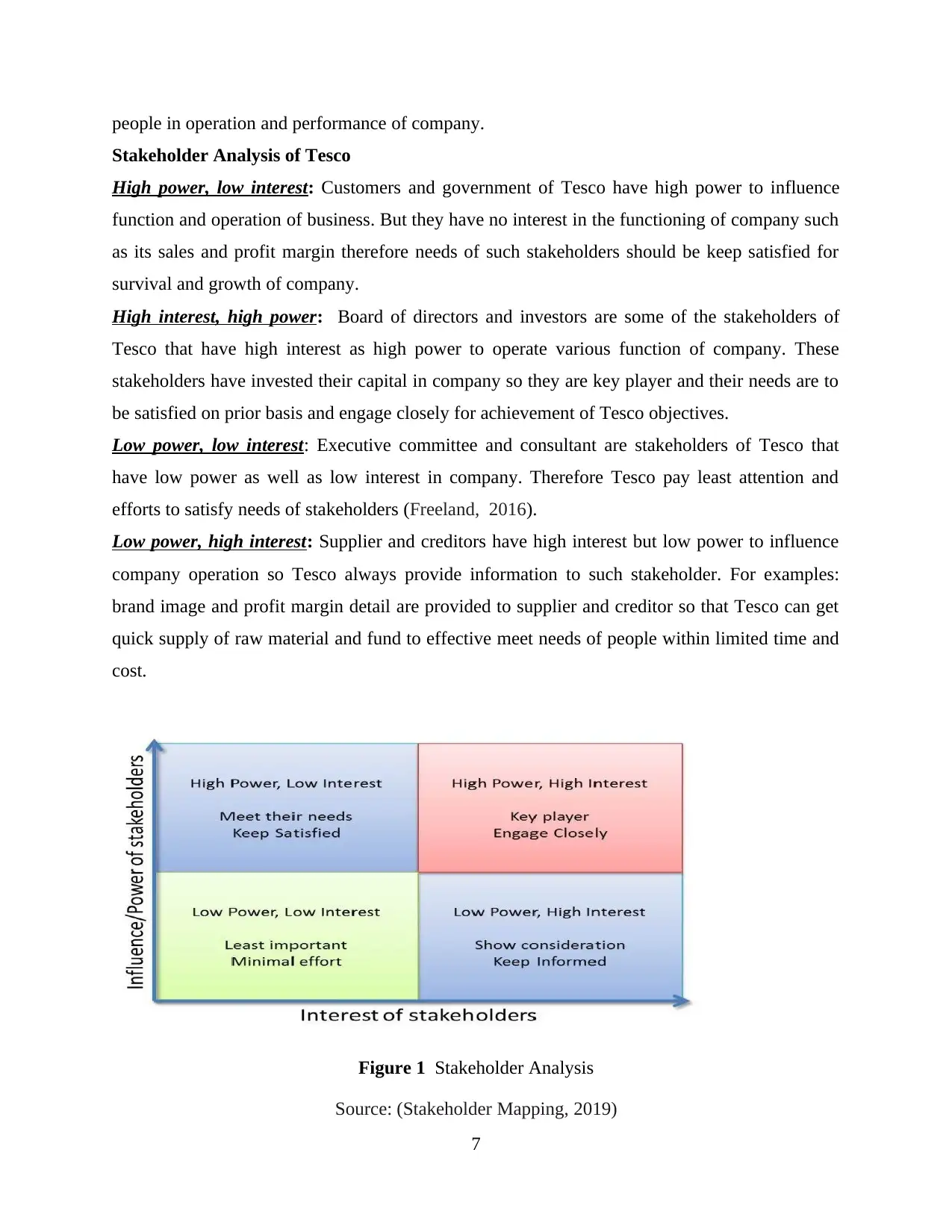
people in operation and performance of company.
Stakeholder Analysis of Tesco
High power, low interest: Customers and government of Tesco have high power to influence
function and operation of business. But they have no interest in the functioning of company such
as its sales and profit margin therefore needs of such stakeholders should be keep satisfied for
survival and growth of company.
High interest, high power: Board of directors and investors are some of the stakeholders of
Tesco that have high interest as high power to operate various function of company. These
stakeholders have invested their capital in company so they are key player and their needs are to
be satisfied on prior basis and engage closely for achievement of Tesco objectives.
Low power, low interest: Executive committee and consultant are stakeholders of Tesco that
have low power as well as low interest in company. Therefore Tesco pay least attention and
efforts to satisfy needs of stakeholders (Freeland, 2016).
Low power, high interest: Supplier and creditors have high interest but low power to influence
company operation so Tesco always provide information to such stakeholder. For examples:
brand image and profit margin detail are provided to supplier and creditor so that Tesco can get
quick supply of raw material and fund to effective meet needs of people within limited time and
cost.
Figure 1 Stakeholder Analysis
Source: (Stakeholder Mapping, 2019)
7
Stakeholder Analysis of Tesco
High power, low interest: Customers and government of Tesco have high power to influence
function and operation of business. But they have no interest in the functioning of company such
as its sales and profit margin therefore needs of such stakeholders should be keep satisfied for
survival and growth of company.
High interest, high power: Board of directors and investors are some of the stakeholders of
Tesco that have high interest as high power to operate various function of company. These
stakeholders have invested their capital in company so they are key player and their needs are to
be satisfied on prior basis and engage closely for achievement of Tesco objectives.
Low power, low interest: Executive committee and consultant are stakeholders of Tesco that
have low power as well as low interest in company. Therefore Tesco pay least attention and
efforts to satisfy needs of stakeholders (Freeland, 2016).
Low power, high interest: Supplier and creditors have high interest but low power to influence
company operation so Tesco always provide information to such stakeholder. For examples:
brand image and profit margin detail are provided to supplier and creditor so that Tesco can get
quick supply of raw material and fund to effective meet needs of people within limited time and
cost.
Figure 1 Stakeholder Analysis
Source: (Stakeholder Mapping, 2019)
7
Paraphrase This Document
Need a fresh take? Get an instant paraphrase of this document with our AI Paraphraser
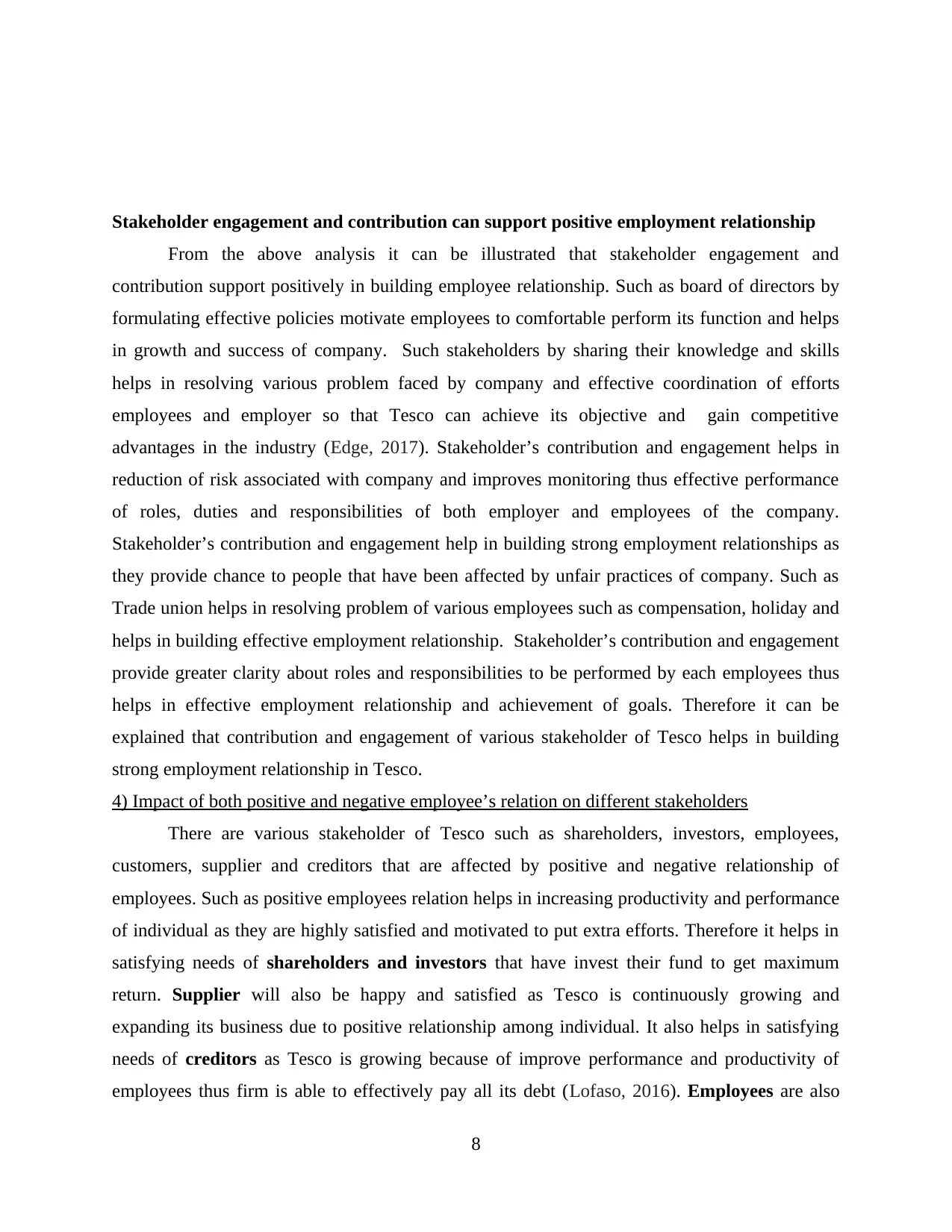
Stakeholder engagement and contribution can support positive employment relationship
From the above analysis it can be illustrated that stakeholder engagement and
contribution support positively in building employee relationship. Such as board of directors by
formulating effective policies motivate employees to comfortable perform its function and helps
in growth and success of company. Such stakeholders by sharing their knowledge and skills
helps in resolving various problem faced by company and effective coordination of efforts
employees and employer so that Tesco can achieve its objective and gain competitive
advantages in the industry (Edge, 2017). Stakeholder’s contribution and engagement helps in
reduction of risk associated with company and improves monitoring thus effective performance
of roles, duties and responsibilities of both employer and employees of the company.
Stakeholder’s contribution and engagement help in building strong employment relationships as
they provide chance to people that have been affected by unfair practices of company. Such as
Trade union helps in resolving problem of various employees such as compensation, holiday and
helps in building effective employment relationship. Stakeholder’s contribution and engagement
provide greater clarity about roles and responsibilities to be performed by each employees thus
helps in effective employment relationship and achievement of goals. Therefore it can be
explained that contribution and engagement of various stakeholder of Tesco helps in building
strong employment relationship in Tesco.
4) Impact of both positive and negative employee’s relation on different stakeholders
There are various stakeholder of Tesco such as shareholders, investors, employees,
customers, supplier and creditors that are affected by positive and negative relationship of
employees. Such as positive employees relation helps in increasing productivity and performance
of individual as they are highly satisfied and motivated to put extra efforts. Therefore it helps in
satisfying needs of shareholders and investors that have invest their fund to get maximum
return. Supplier will also be happy and satisfied as Tesco is continuously growing and
expanding its business due to positive relationship among individual. It also helps in satisfying
needs of creditors as Tesco is growing because of improve performance and productivity of
employees thus firm is able to effectively pay all its debt (Lofaso, 2016). Employees are also
8
From the above analysis it can be illustrated that stakeholder engagement and
contribution support positively in building employee relationship. Such as board of directors by
formulating effective policies motivate employees to comfortable perform its function and helps
in growth and success of company. Such stakeholders by sharing their knowledge and skills
helps in resolving various problem faced by company and effective coordination of efforts
employees and employer so that Tesco can achieve its objective and gain competitive
advantages in the industry (Edge, 2017). Stakeholder’s contribution and engagement helps in
reduction of risk associated with company and improves monitoring thus effective performance
of roles, duties and responsibilities of both employer and employees of the company.
Stakeholder’s contribution and engagement help in building strong employment relationships as
they provide chance to people that have been affected by unfair practices of company. Such as
Trade union helps in resolving problem of various employees such as compensation, holiday and
helps in building effective employment relationship. Stakeholder’s contribution and engagement
provide greater clarity about roles and responsibilities to be performed by each employees thus
helps in effective employment relationship and achievement of goals. Therefore it can be
explained that contribution and engagement of various stakeholder of Tesco helps in building
strong employment relationship in Tesco.
4) Impact of both positive and negative employee’s relation on different stakeholders
There are various stakeholder of Tesco such as shareholders, investors, employees,
customers, supplier and creditors that are affected by positive and negative relationship of
employees. Such as positive employees relation helps in increasing productivity and performance
of individual as they are highly satisfied and motivated to put extra efforts. Therefore it helps in
satisfying needs of shareholders and investors that have invest their fund to get maximum
return. Supplier will also be happy and satisfied as Tesco is continuously growing and
expanding its business due to positive relationship among individual. It also helps in satisfying
needs of creditors as Tesco is growing because of improve performance and productivity of
employees thus firm is able to effectively pay all its debt (Lofaso, 2016). Employees are also
8
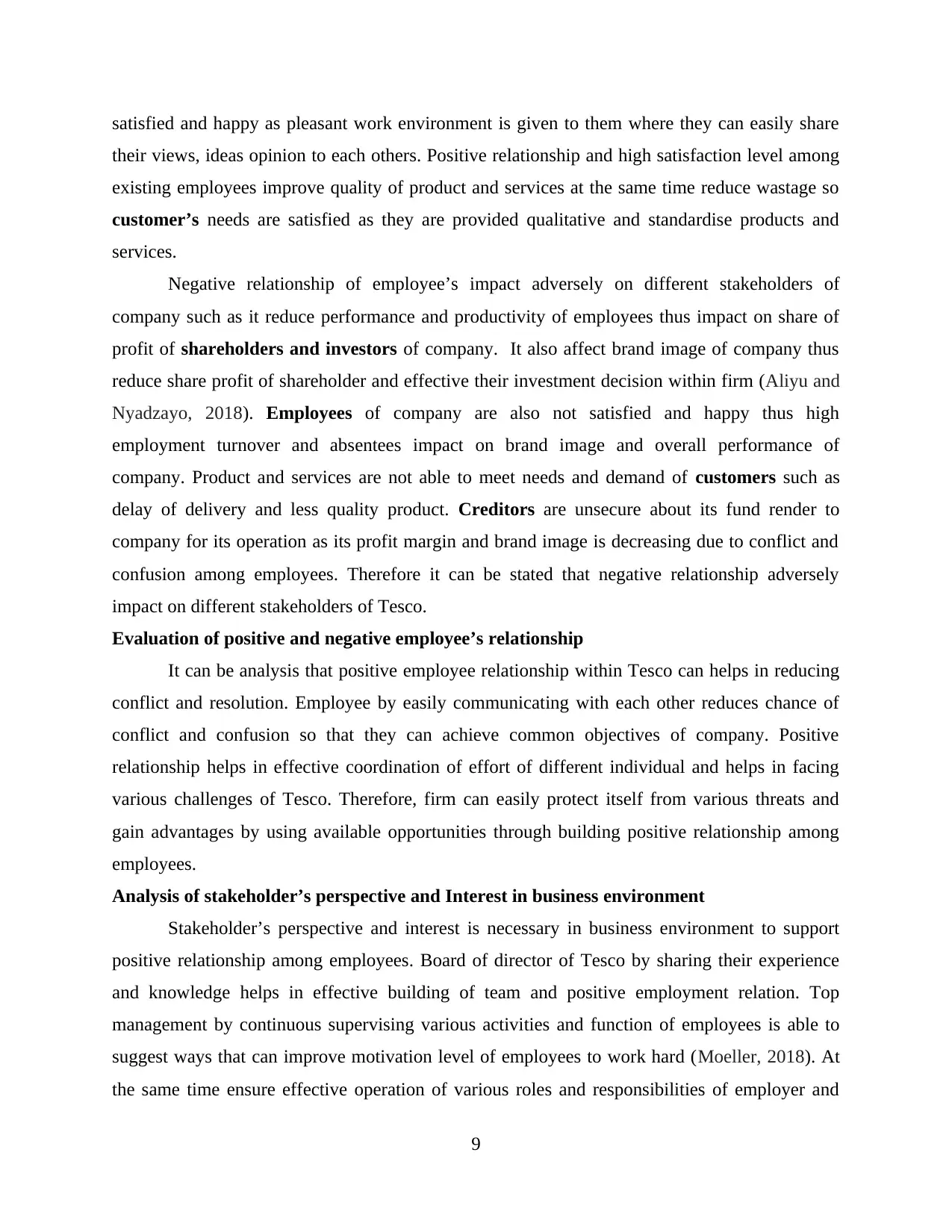
satisfied and happy as pleasant work environment is given to them where they can easily share
their views, ideas opinion to each others. Positive relationship and high satisfaction level among
existing employees improve quality of product and services at the same time reduce wastage so
customer’s needs are satisfied as they are provided qualitative and standardise products and
services.
Negative relationship of employee’s impact adversely on different stakeholders of
company such as it reduce performance and productivity of employees thus impact on share of
profit of shareholders and investors of company. It also affect brand image of company thus
reduce share profit of shareholder and effective their investment decision within firm (Aliyu and
Nyadzayo, 2018). Employees of company are also not satisfied and happy thus high
employment turnover and absentees impact on brand image and overall performance of
company. Product and services are not able to meet needs and demand of customers such as
delay of delivery and less quality product. Creditors are unsecure about its fund render to
company for its operation as its profit margin and brand image is decreasing due to conflict and
confusion among employees. Therefore it can be stated that negative relationship adversely
impact on different stakeholders of Tesco.
Evaluation of positive and negative employee’s relationship
It can be analysis that positive employee relationship within Tesco can helps in reducing
conflict and resolution. Employee by easily communicating with each other reduces chance of
conflict and confusion so that they can achieve common objectives of company. Positive
relationship helps in effective coordination of effort of different individual and helps in facing
various challenges of Tesco. Therefore, firm can easily protect itself from various threats and
gain advantages by using available opportunities through building positive relationship among
employees.
Analysis of stakeholder’s perspective and Interest in business environment
Stakeholder’s perspective and interest is necessary in business environment to support
positive relationship among employees. Board of director of Tesco by sharing their experience
and knowledge helps in effective building of team and positive employment relation. Top
management by continuous supervising various activities and function of employees is able to
suggest ways that can improve motivation level of employees to work hard (Moeller, 2018). At
the same time ensure effective operation of various roles and responsibilities of employer and
9
their views, ideas opinion to each others. Positive relationship and high satisfaction level among
existing employees improve quality of product and services at the same time reduce wastage so
customer’s needs are satisfied as they are provided qualitative and standardise products and
services.
Negative relationship of employee’s impact adversely on different stakeholders of
company such as it reduce performance and productivity of employees thus impact on share of
profit of shareholders and investors of company. It also affect brand image of company thus
reduce share profit of shareholder and effective their investment decision within firm (Aliyu and
Nyadzayo, 2018). Employees of company are also not satisfied and happy thus high
employment turnover and absentees impact on brand image and overall performance of
company. Product and services are not able to meet needs and demand of customers such as
delay of delivery and less quality product. Creditors are unsecure about its fund render to
company for its operation as its profit margin and brand image is decreasing due to conflict and
confusion among employees. Therefore it can be stated that negative relationship adversely
impact on different stakeholders of Tesco.
Evaluation of positive and negative employee’s relationship
It can be analysis that positive employee relationship within Tesco can helps in reducing
conflict and resolution. Employee by easily communicating with each other reduces chance of
conflict and confusion so that they can achieve common objectives of company. Positive
relationship helps in effective coordination of effort of different individual and helps in facing
various challenges of Tesco. Therefore, firm can easily protect itself from various threats and
gain advantages by using available opportunities through building positive relationship among
employees.
Analysis of stakeholder’s perspective and Interest in business environment
Stakeholder’s perspective and interest is necessary in business environment to support
positive relationship among employees. Board of director of Tesco by sharing their experience
and knowledge helps in effective building of team and positive employment relation. Top
management by continuous supervising various activities and function of employees is able to
suggest ways that can improve motivation level of employees to work hard (Moeller, 2018). At
the same time ensure effective operation of various roles and responsibilities of employer and
9
⊘ This is a preview!⊘
Do you want full access?
Subscribe today to unlock all pages.

Trusted by 1+ million students worldwide
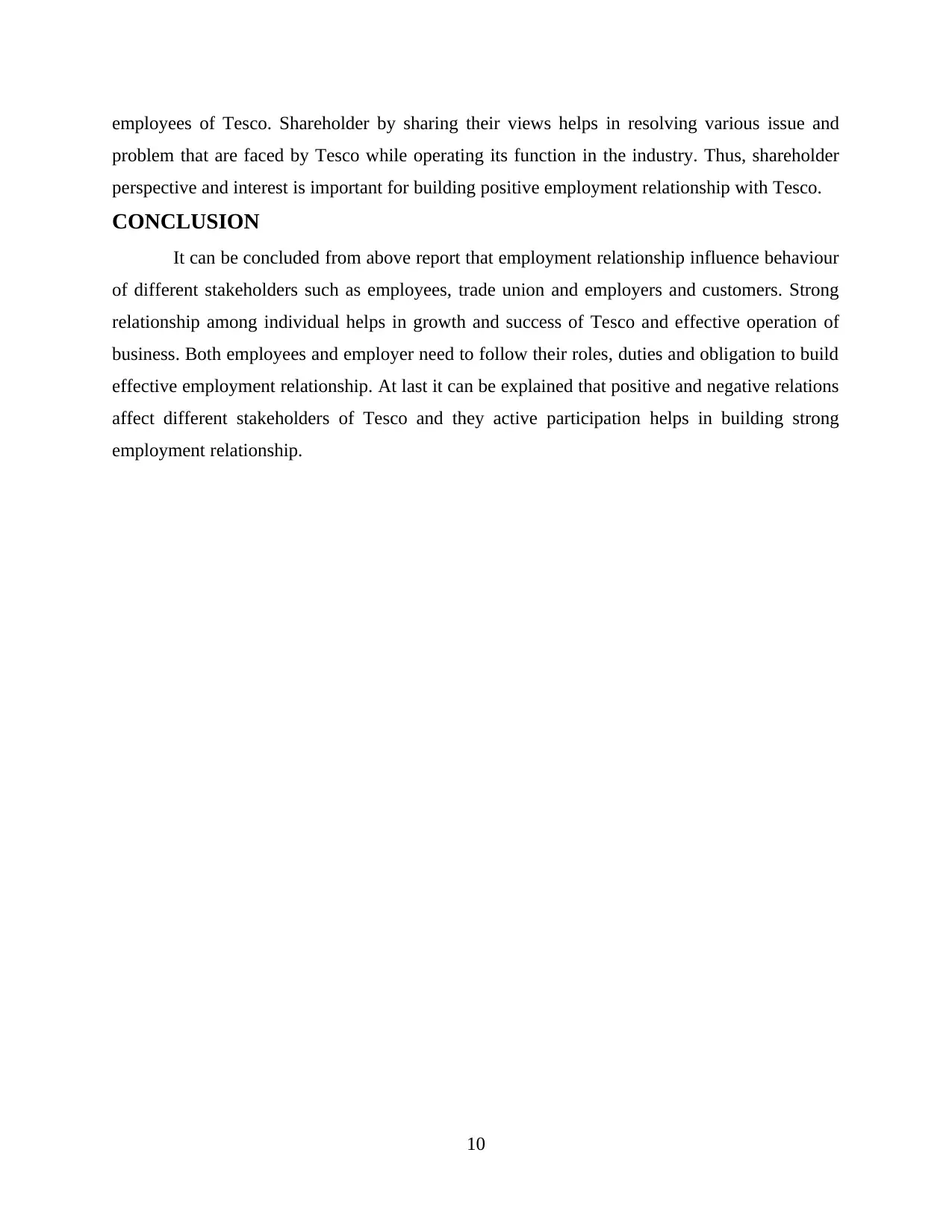
employees of Tesco. Shareholder by sharing their views helps in resolving various issue and
problem that are faced by Tesco while operating its function in the industry. Thus, shareholder
perspective and interest is important for building positive employment relationship with Tesco.
CONCLUSION
It can be concluded from above report that employment relationship influence behaviour
of different stakeholders such as employees, trade union and employers and customers. Strong
relationship among individual helps in growth and success of Tesco and effective operation of
business. Both employees and employer need to follow their roles, duties and obligation to build
effective employment relationship. At last it can be explained that positive and negative relations
affect different stakeholders of Tesco and they active participation helps in building strong
employment relationship.
10
problem that are faced by Tesco while operating its function in the industry. Thus, shareholder
perspective and interest is important for building positive employment relationship with Tesco.
CONCLUSION
It can be concluded from above report that employment relationship influence behaviour
of different stakeholders such as employees, trade union and employers and customers. Strong
relationship among individual helps in growth and success of Tesco and effective operation of
business. Both employees and employer need to follow their roles, duties and obligation to build
effective employment relationship. At last it can be explained that positive and negative relations
affect different stakeholders of Tesco and they active participation helps in building strong
employment relationship.
10
Paraphrase This Document
Need a fresh take? Get an instant paraphrase of this document with our AI Paraphraser
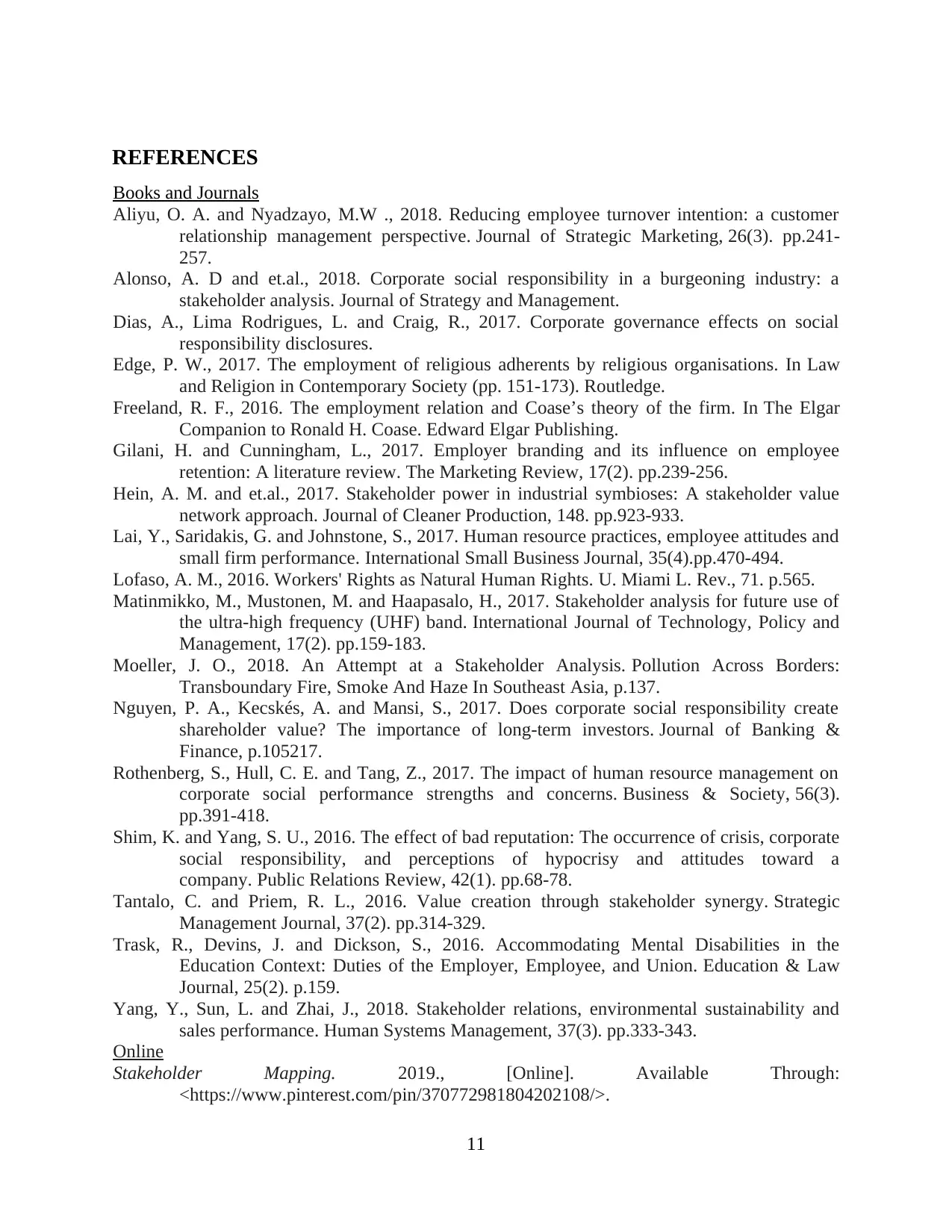
REFERENCES
Books and Journals
Aliyu, O. A. and Nyadzayo, M.W ., 2018. Reducing employee turnover intention: a customer
relationship management perspective. Journal of Strategic Marketing, 26(3). pp.241-
257.
Alonso, A. D and et.al., 2018. Corporate social responsibility in a burgeoning industry: a
stakeholder analysis. Journal of Strategy and Management.
Dias, A., Lima Rodrigues, L. and Craig, R., 2017. Corporate governance effects on social
responsibility disclosures.
Edge, P. W., 2017. The employment of religious adherents by religious organisations. In Law
and Religion in Contemporary Society (pp. 151-173). Routledge.
Freeland, R. F., 2016. The employment relation and Coase’s theory of the firm. In The Elgar
Companion to Ronald H. Coase. Edward Elgar Publishing.
Gilani, H. and Cunningham, L., 2017. Employer branding and its influence on employee
retention: A literature review. The Marketing Review, 17(2). pp.239-256.
Hein, A. M. and et.al., 2017. Stakeholder power in industrial symbioses: A stakeholder value
network approach. Journal of Cleaner Production, 148. pp.923-933.
Lai, Y., Saridakis, G. and Johnstone, S., 2017. Human resource practices, employee attitudes and
small firm performance. International Small Business Journal, 35(4).pp.470-494.
Lofaso, A. M., 2016. Workers' Rights as Natural Human Rights. U. Miami L. Rev., 71. p.565.
Matinmikko, M., Mustonen, M. and Haapasalo, H., 2017. Stakeholder analysis for future use of
the ultra-high frequency (UHF) band. International Journal of Technology, Policy and
Management, 17(2). pp.159-183.
Moeller, J. O., 2018. An Attempt at a Stakeholder Analysis. Pollution Across Borders:
Transboundary Fire, Smoke And Haze In Southeast Asia, p.137.
Nguyen, P. A., Kecskés, A. and Mansi, S., 2017. Does corporate social responsibility create
shareholder value? The importance of long-term investors. Journal of Banking &
Finance, p.105217.
Rothenberg, S., Hull, C. E. and Tang, Z., 2017. The impact of human resource management on
corporate social performance strengths and concerns. Business & Society, 56(3).
pp.391-418.
Shim, K. and Yang, S. U., 2016. The effect of bad reputation: The occurrence of crisis, corporate
social responsibility, and perceptions of hypocrisy and attitudes toward a
company. Public Relations Review, 42(1). pp.68-78.
Tantalo, C. and Priem, R. L., 2016. Value creation through stakeholder synergy. Strategic
Management Journal, 37(2). pp.314-329.
Trask, R., Devins, J. and Dickson, S., 2016. Accommodating Mental Disabilities in the
Education Context: Duties of the Employer, Employee, and Union. Education & Law
Journal, 25(2). p.159.
Yang, Y., Sun, L. and Zhai, J., 2018. Stakeholder relations, environmental sustainability and
sales performance. Human Systems Management, 37(3). pp.333-343.
Online
Stakeholder Mapping. 2019., [Online]. Available Through:
<https://www.pinterest.com/pin/370772981804202108/>.
11
Books and Journals
Aliyu, O. A. and Nyadzayo, M.W ., 2018. Reducing employee turnover intention: a customer
relationship management perspective. Journal of Strategic Marketing, 26(3). pp.241-
257.
Alonso, A. D and et.al., 2018. Corporate social responsibility in a burgeoning industry: a
stakeholder analysis. Journal of Strategy and Management.
Dias, A., Lima Rodrigues, L. and Craig, R., 2017. Corporate governance effects on social
responsibility disclosures.
Edge, P. W., 2017. The employment of religious adherents by religious organisations. In Law
and Religion in Contemporary Society (pp. 151-173). Routledge.
Freeland, R. F., 2016. The employment relation and Coase’s theory of the firm. In The Elgar
Companion to Ronald H. Coase. Edward Elgar Publishing.
Gilani, H. and Cunningham, L., 2017. Employer branding and its influence on employee
retention: A literature review. The Marketing Review, 17(2). pp.239-256.
Hein, A. M. and et.al., 2017. Stakeholder power in industrial symbioses: A stakeholder value
network approach. Journal of Cleaner Production, 148. pp.923-933.
Lai, Y., Saridakis, G. and Johnstone, S., 2017. Human resource practices, employee attitudes and
small firm performance. International Small Business Journal, 35(4).pp.470-494.
Lofaso, A. M., 2016. Workers' Rights as Natural Human Rights. U. Miami L. Rev., 71. p.565.
Matinmikko, M., Mustonen, M. and Haapasalo, H., 2017. Stakeholder analysis for future use of
the ultra-high frequency (UHF) band. International Journal of Technology, Policy and
Management, 17(2). pp.159-183.
Moeller, J. O., 2018. An Attempt at a Stakeholder Analysis. Pollution Across Borders:
Transboundary Fire, Smoke And Haze In Southeast Asia, p.137.
Nguyen, P. A., Kecskés, A. and Mansi, S., 2017. Does corporate social responsibility create
shareholder value? The importance of long-term investors. Journal of Banking &
Finance, p.105217.
Rothenberg, S., Hull, C. E. and Tang, Z., 2017. The impact of human resource management on
corporate social performance strengths and concerns. Business & Society, 56(3).
pp.391-418.
Shim, K. and Yang, S. U., 2016. The effect of bad reputation: The occurrence of crisis, corporate
social responsibility, and perceptions of hypocrisy and attitudes toward a
company. Public Relations Review, 42(1). pp.68-78.
Tantalo, C. and Priem, R. L., 2016. Value creation through stakeholder synergy. Strategic
Management Journal, 37(2). pp.314-329.
Trask, R., Devins, J. and Dickson, S., 2016. Accommodating Mental Disabilities in the
Education Context: Duties of the Employer, Employee, and Union. Education & Law
Journal, 25(2). p.159.
Yang, Y., Sun, L. and Zhai, J., 2018. Stakeholder relations, environmental sustainability and
sales performance. Human Systems Management, 37(3). pp.333-343.
Online
Stakeholder Mapping. 2019., [Online]. Available Through:
<https://www.pinterest.com/pin/370772981804202108/>.
11
1 out of 11
Related Documents
Your All-in-One AI-Powered Toolkit for Academic Success.
+13062052269
info@desklib.com
Available 24*7 on WhatsApp / Email
![[object Object]](/_next/static/media/star-bottom.7253800d.svg)
Unlock your academic potential
Copyright © 2020–2026 A2Z Services. All Rights Reserved. Developed and managed by ZUCOL.





